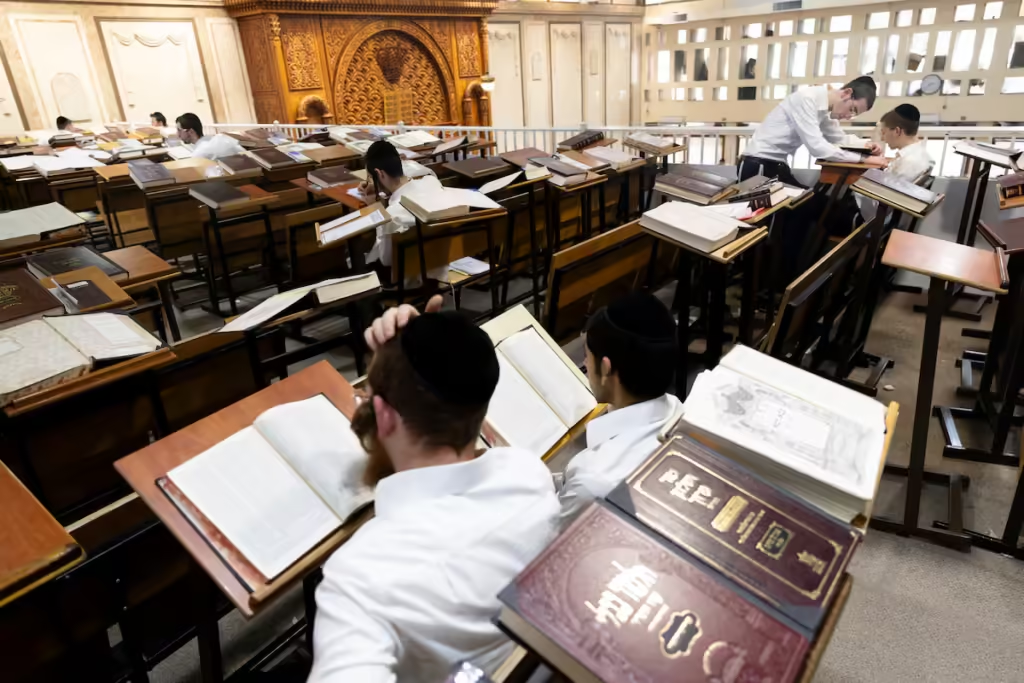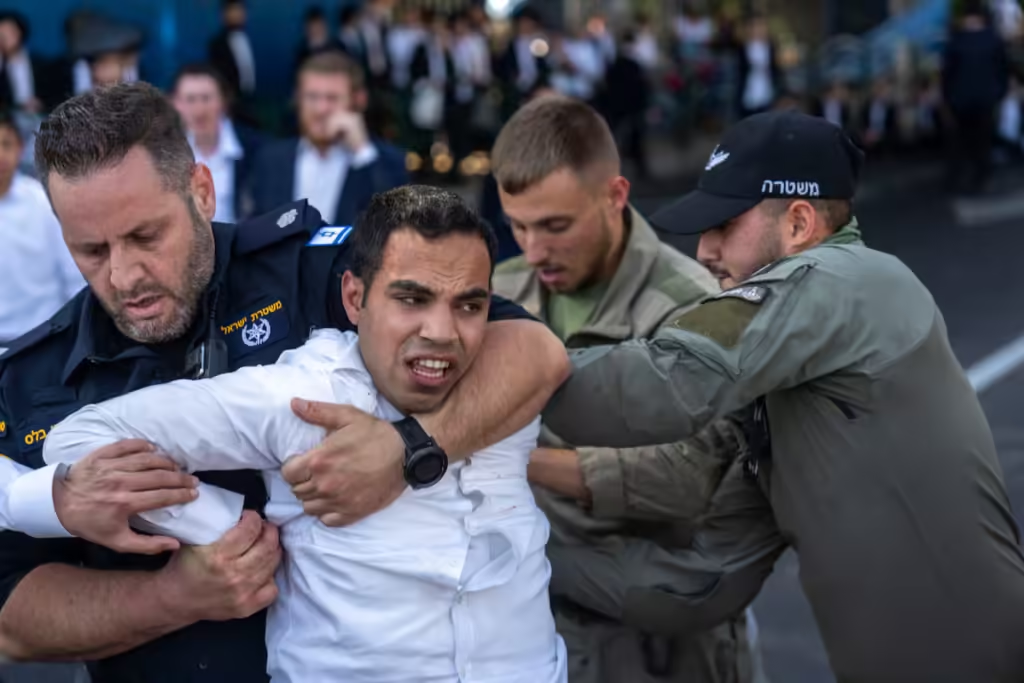On Tuesday, Israel’s Supreme Court decided unanimously that ultra-Orthodox yeshiva students must now be forced to join the Israeli military.
This means that they can no longer get many government benefits. This important choice could make Prime Minister Benjamin Netanyahu’s coalition government less stable.
The role of the ultra-Orthodox, or Haredim, in Israeli society has been a point of contention for many years. The number of Haredim has grown to over a million, making up more than 12 percent of the population.
They used to be a small group. Netanyahu’s government gave them exemptions from military service and a lot of money for their institutions in exchange for their political backing.
But since Israel requires everyone to serve in the military and security worries are growing, more and more people from all political parties are calling for these exemptions to be taken away.
The Supreme Court’s ruling on Tuesday officially met these long-standing requests.
“Inequality is more important than ever during a violent conflict and needs to be fixed,” said Justice Uzi Vogelman, one of the nine judges who agreed with the decision.
Leaders of the Haredim group replied angrily, saying that their religious studies are what make the country spiritual.
Following the decision, Aryeh Deri, leader of the ultra-Orthodox Shas party, said, “No force in the world can stop the people of Israel from studying the Torah, and those who have tried in the past have failed miserably.”

Culture war
The government helps the ultra-Orthodox community by giving money to privately run schools where many students spend their whole lives studying the Torah.
The government also gives money to many religious and social groups. There is a lot of independence in this town, and it stays mostly separate from the rest of society.
Not many people live here, work, pay taxes, or serve in the military.
The justices stressed that Israel can no longer afford to let the ultra-Orthodox off the hook when it comes to their civic duties.
The country is currently in the middle of its longest war in Gaza and could open a second front in Lebanon.
This decision builds on a similar one made by the Supreme Court in March, which stopped the government from giving money to ultra-Orthodox yeshivas where students decided to study instead of serving in the military.
Michal Feuer, who is a mother of two soldiers, was pleased with the court’s decision on Tuesday. Last year, she and thousands of other women joined Mothers on the Front to fight against the ultra-Orthodox exemption.
“I’ve opposed this injustice for years,” she told me. “In past elections, I supported candidates who prioritized this issue.”
On October 7, militants led by Hamas killed about 1,200 people in Israel and took about 250 hostages into Gaza, which made the situation even more urgent. This added a new dimension to the discussion.
“We’ve lost hundreds of soldiers and thousands have been injured; the army desperately needs more recruits,” she added.
Feuer’s older son, who is 21, finished the military service he had to do in April and was immediately called up for reserve duty.
His first three months were spent in Gaza, and the last few months have been spent on the northern border with Lebanon. It was a surprise when her younger son, who is almost 19, was drafted while on a gap year doing charity work.
“There were weeks without any word from him” while her older son was in Gaza, she said. You’re left in the dark, waiting for that feared knock on the door.
“In Hebrew, we have a saying,” she said. “‘There’s an Orthodox mother and there’s a fearful mother,’ because they don’t understand the fear we live with.”
Israel’s protracted conflict in Gaza has resulted in over 37,000 Palestinian deaths, according to the Gaza Health Ministry, which reports that the majority of those killed are women and children, without distinguishing between combatants and civilians.
Israeli troops continue to engage Hamas throughout the enclave, and Netanyahu announced this week that the fighting will persist even after the conclusion of major combat operations.
On the border with Lebanon, Israel and militants backed by Iran called Hezbollah have been trading deadly fire. Both sides have said they are getting ready for war.
As the number of Israeli soldiers killed rises (at least 333, according to the IDF) and others come home hurt physically and mentally, anger toward the Haredim grows.
The Jewish People Policy Institute (JPPI), a neutral think tank in Jerusalem, did a poll and found that 81% of Jewish Israelis want to change the exemption for the ultra-Orthodox. Of those, 45% want “coercive” measures and 36% want “persuasive” ones.

Political fallout
Shuki Friedman, vice president of the JPPI, highlighted the political dilemma now confronting the ultra-Orthodox community.
“On one hand, they aim to avert what they see as a disaster. However, on the other hand, if the government collapses and elections are called, the outcome might be less favorable for them, potentially leading to even fewer concessions,” he explained.
Polls consistently indicate that Netanyahu would struggle to form a governing coalition without the support of ultra-Orthodox parties, which have been pivotal in past governments.
A statement issued Tuesday by Netanyahu’s Likud party suggested that the Supreme Court ruling would have limited relevance over a short period. It criticized the timing of the ruling, given the government’s simultaneous efforts to advance an older law — previously rejected by the ultra-Orthodox — that proposes partial enlistment of the Haredim.
Under Netanyahu’s leadership, ultra-Orthodox politicians are likely to employ delaying tactics to postpone enlistment, observed Yitzik Crombie, a Haredi activist advocating for community integration into Israel’s high-tech sector.
“The Haredi leadership faces a crucial decision on whether to fully integrate into Israeli society or remain as guests,” Crombie remarked. “This moment isn’t just about fate; after the Holocaust, we came here and built a nation. It’s about defining our mission.”
A lot of practical things need to be thought about, like how many men should be drafted, what will happen to those who refuse, and how to fit things like kosher food, prayer times, and other daily religious practices into the busy military routine.
The Israel Defense Forces have said they are ready to accept new members, but adding them is likely to change the way the country’s treasured “people’s army,” which has long been seen as a sign of national unity, works.
Israel Cohen, an analyst on the ultra-Orthodox radio station Kol Berama, said on Tuesday that the community knows it needs to find a middle ground after what happened on October 7.
He said that up until now, their anger had been directed at the Supreme Court rather than Netanyahu. This gave him a short time to pass laws that would recognize the new situation while still protecting ultra-Orthodox values.
“Now is the moment of truth for Netanyahu to enact legislation,” he said. “If he fails to do so, their support for this government will vanish.”
 Twitter
Twitter Facebook
Facebook